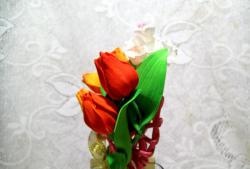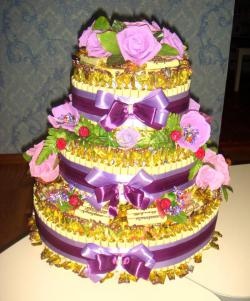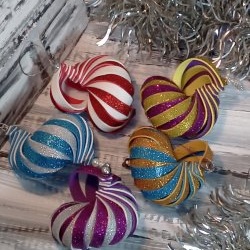Decorating glasses with hydrangea flowers and anemones from foamiran
Such glasses will be an excellent table decoration for celebrations and celebrations. These flowers are not afraid of water and do not wrinkle.
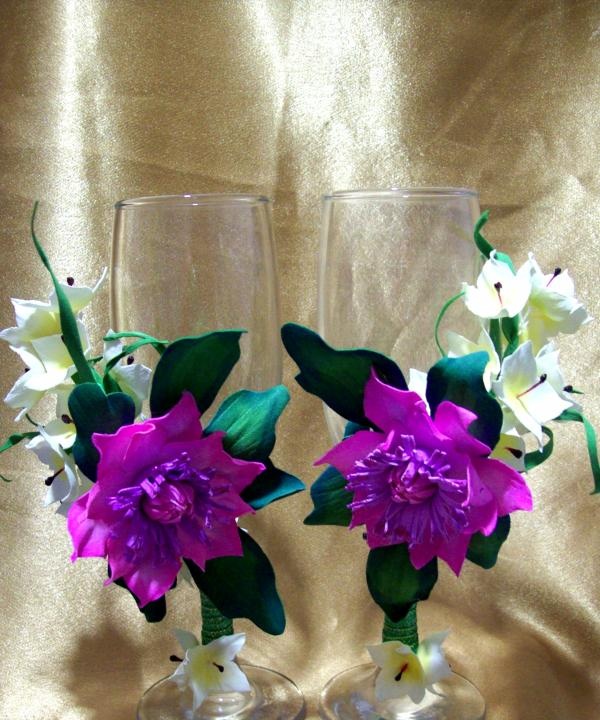
For work we will need the following materials:
- two tall glasses.
- plastic suede in pink, milky and green colors.
- 80 cm of green tape 0.5 cm wide.
- glue gun.
- floral wire.
- iron.
- scissors.
- “Moment” glue.
- wet wipes.
- toothpicks.
- tweezers.
- glue with glitter for children's creativity.
- the bed is dry, crimson, yellow and purple.
- ready-made stamens for flowers or homemade ones.
- corrugated paper.
First, let's draw templates for future colors. For one glass, the branch will consist of 1 anemone and two large leaves, you also need 10 hydrangea flowers with a diameter of 4 cm and 8 thin leaves. And the anemone consists of 2 six-leaf leaves, one with a diameter of 6.5x6.5 cm, the second 7x7 cm. The leaves for the anemone are 8x7 cm in size, and for the hydrangea we take a rectangle 5x8 cm. Then you need 2 strips measuring 1x16 cm and the second 10x2 cm.
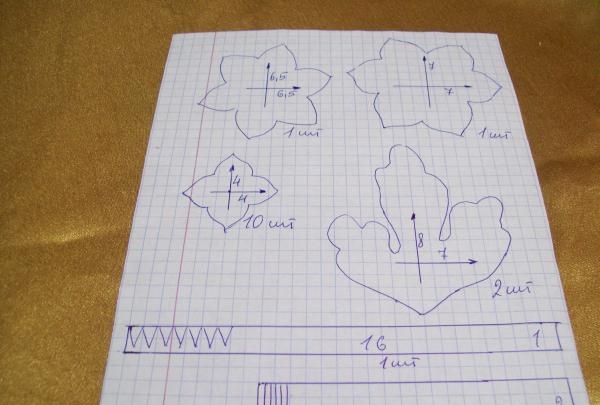
We take pink foamiran and cut out two six-ladders and two stripes. From milky plastic suede we cut out 10-12 quatrefoils, and from green suede we cut out a triangle and two leaves.
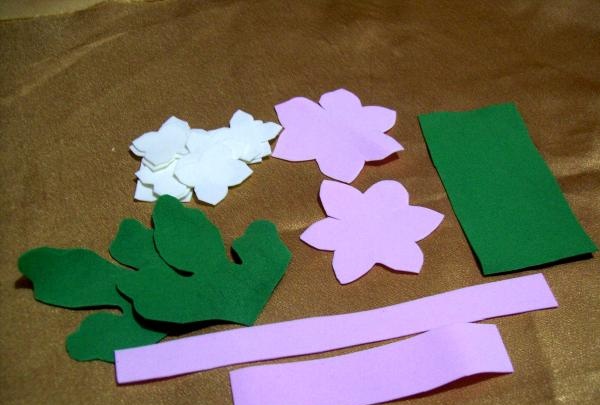
We cut everything with one glass in mind. Now let's start coloring the petals. We take a dry bed of raspberry color and with a finger on which we placed a wet napkin, pick up a little paint and tint along the edges of the leaves on both sides. Considering that the paint will come off a little during further processing of the workpiece.
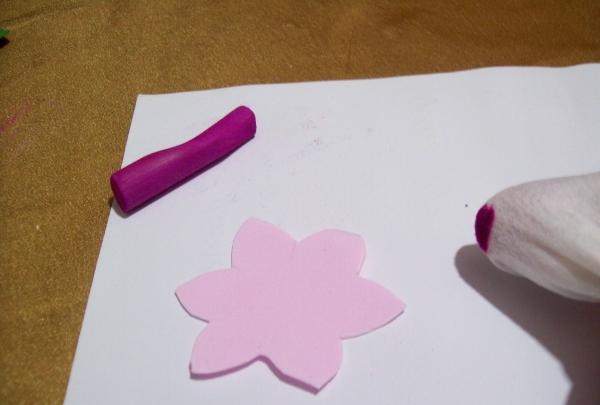
We will tint the thin strip with crimson, and the wide strip will be tinted with purple. On green leaves, we also pass along the edge with a damp cloth with a crimson bed. But on small flowers made from milk foam, we tint only the centers with yellow on both sides.
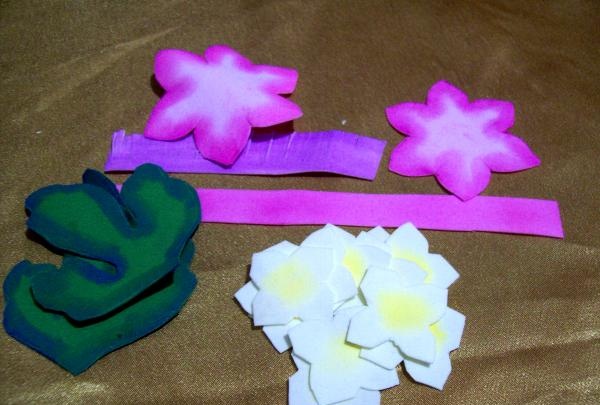
Now you need to cut the green rectangle into 8 parts, similar to a tall triangle. On the pink strip we make teeth like a saw. But the purple blank should have a fringe. You need to cut thin strips, but without cutting to the edge.
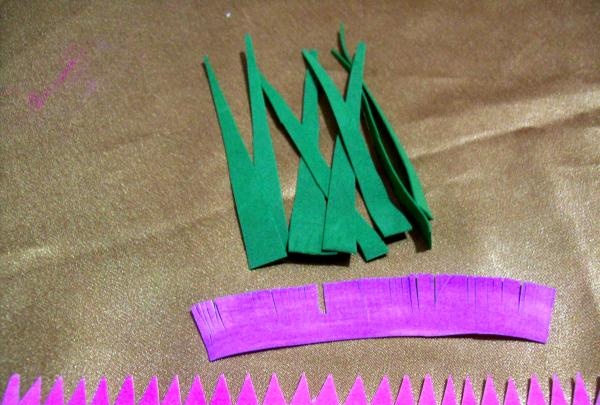
Turn on the iron to the second position or wool. We apply a strip with teeth to the heated surface; from the heat they will take a slightly different shape.
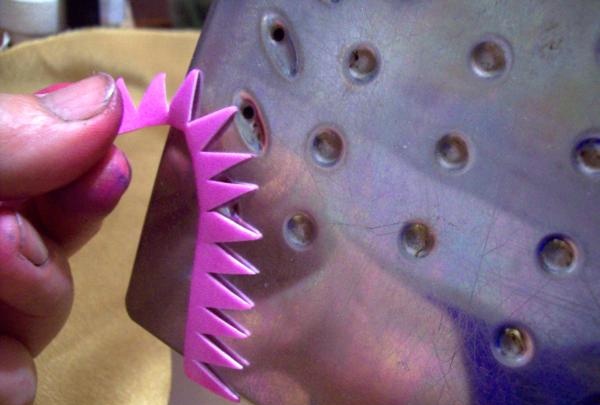
We process the purple fringe in the same way.
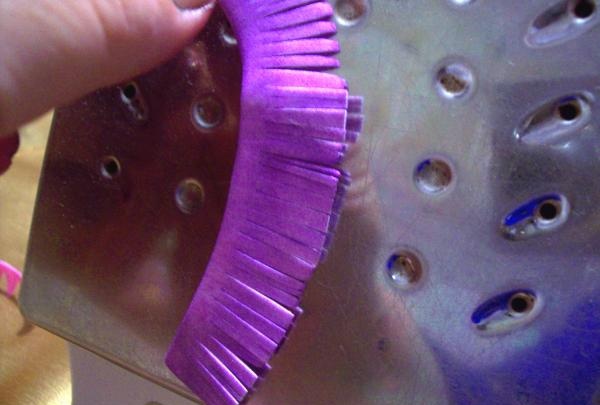
But after ironing, it is advisable to tighten the edges of the fringe with your fingers and they will become thinner and shaggier.
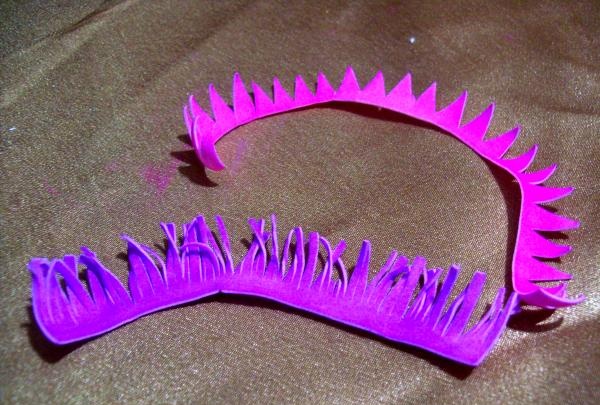
It's time to give the anemone petals a new shape. You also need to apply it to the iron a little and quickly fold it, in three steps, so that all the petals are on top of each other.
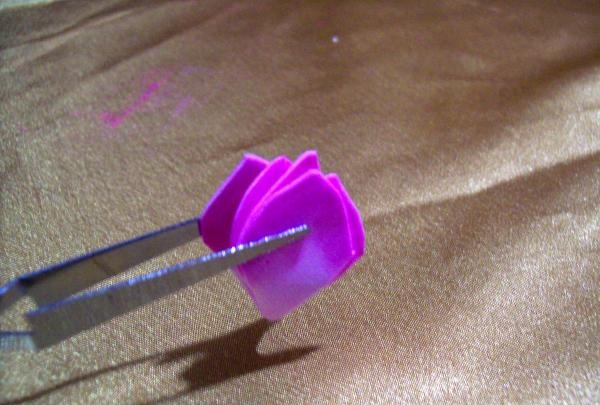
Now carefully roll all the edges of the petals together with your fingers, thinning them, then straighten them a little.
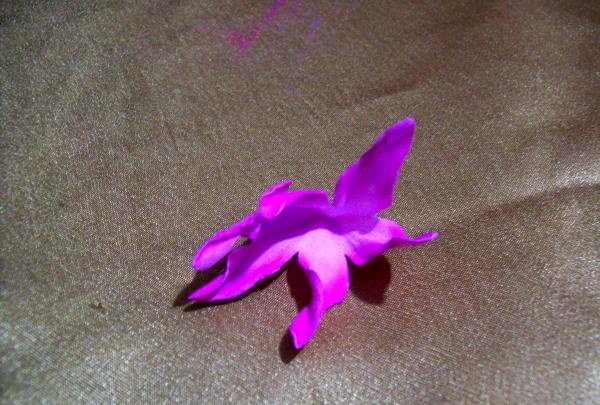
We continue to work on the petal.You need to carefully stretch and straighten each leaf of the petal in the middle with your fingers.
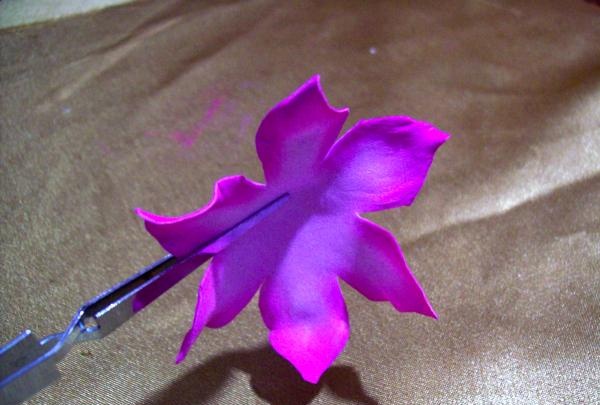
And twist the ends of this workpiece a little more. We process both petals in this way.
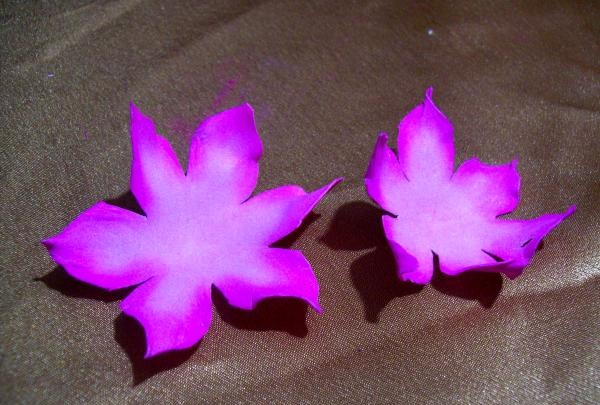
We also give the large green leaves a new shape. We apply it to the iron for a few seconds, and then use the edge of the tweezers to draw stripes, pressing on the sheet. To make the stripes better, you need to place the sheet on a fabric folded several times.
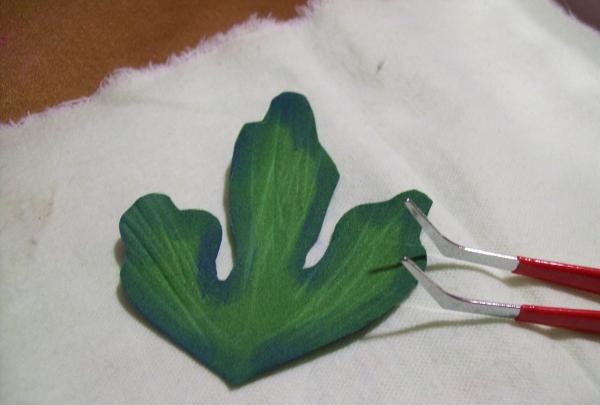
And again, using our fingers, we complete the creation of a new shape, making indentations along the edges and in the middle.
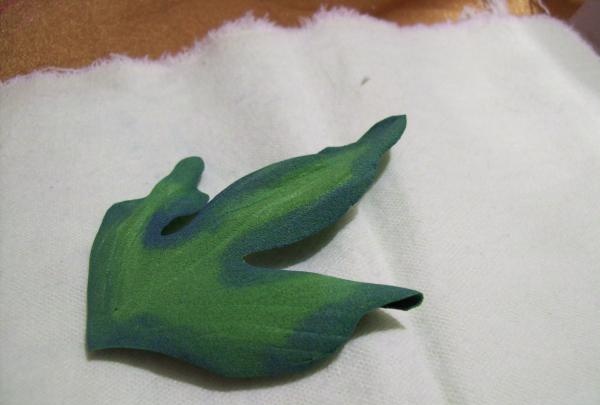
Now the leaves are ready.
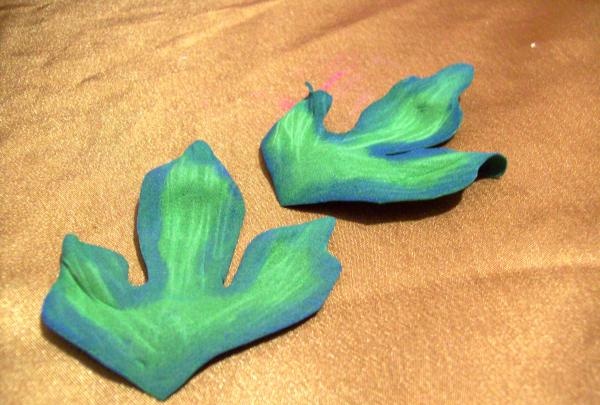
Let's start with the hydrangea petals. We lay one at a time, and if possible, then two at a time, between corrugated paper. We take the iron and heat it through this paper, just press it with the iron. Then, additionally, press with your fingers. The petals have interesting stripes.
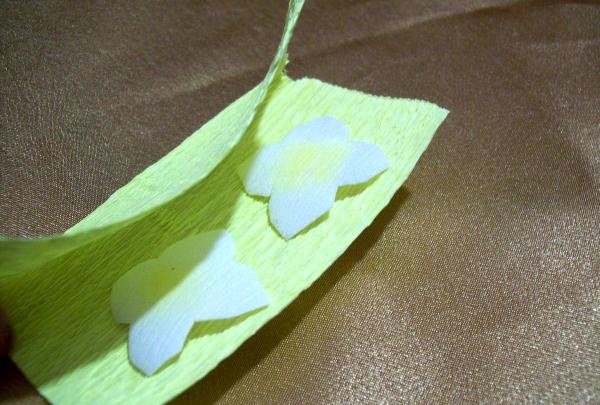
After ironing, we also fold all the petals one on one.
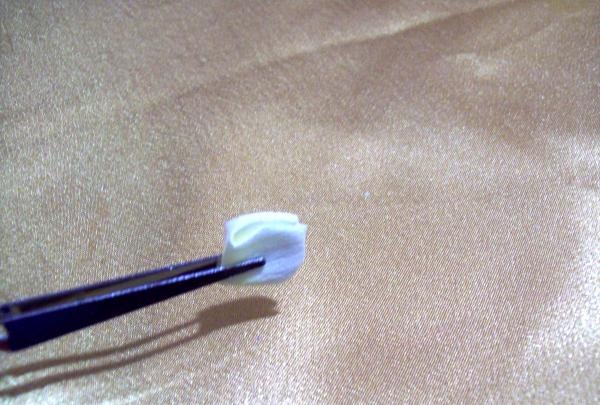
Just like in the previous petals, we twist it, but not much in these flowers. And straighten it, making a depression in the middle of the workpiece.
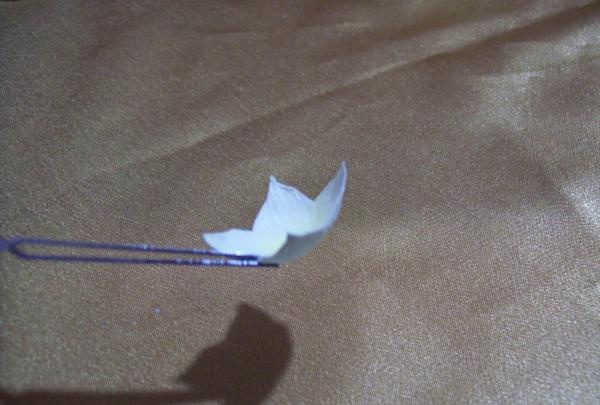
We give a new shape to all these petals.
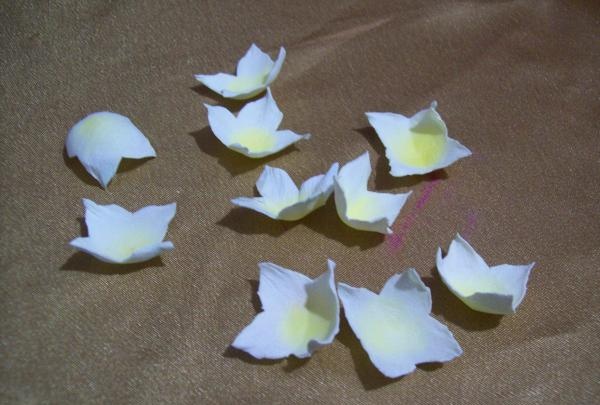
And we give the green thin leaves a little scroll from the thin edge. Simply putting everything together, turn it several times with your fingers.
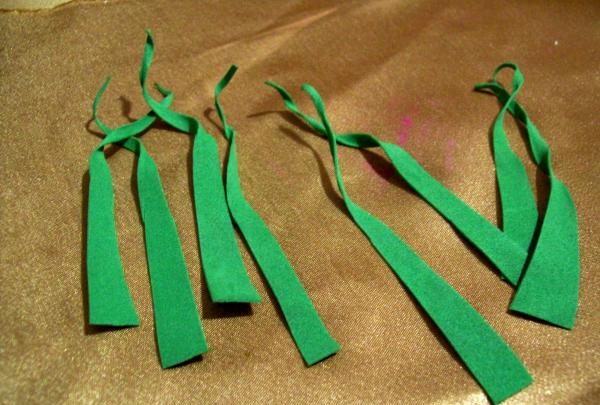
Let's start assembling the anemone flower. We take a piece of floral wire with a diameter of 0.8 mm and a length of 8 cm. We make a small bend loop on one edge.
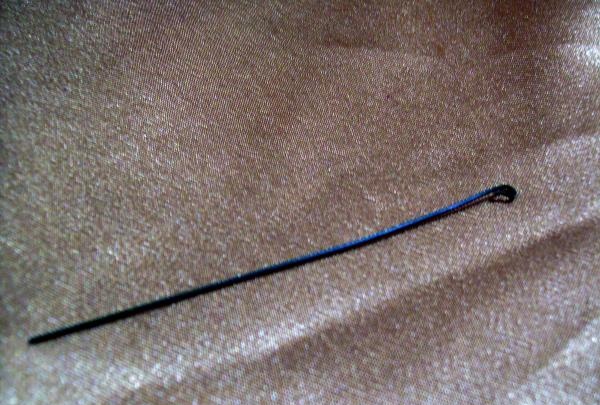
Turn on the glue gun and carefully fasten the strip with the teeth, gluing them by turning them upward. We fix the entire strip at the same level.
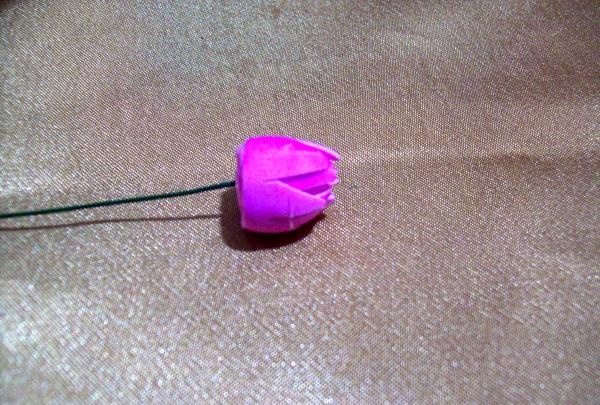
Now we take a purple fringe strip and glue it on top of the first strip, keeping the bottom even. These will be the stamens of the flower.
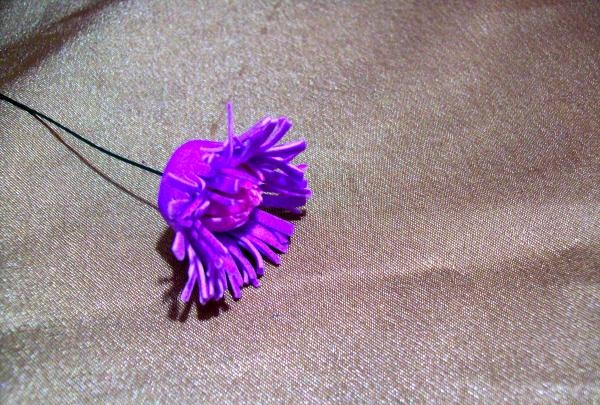
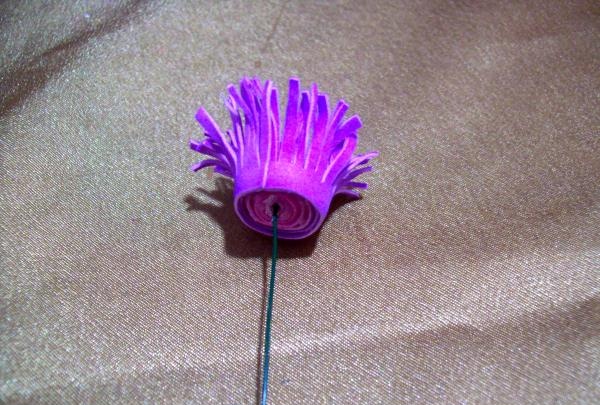
Using a wire with glued stamens, we pierce the middle of a small pink petal.
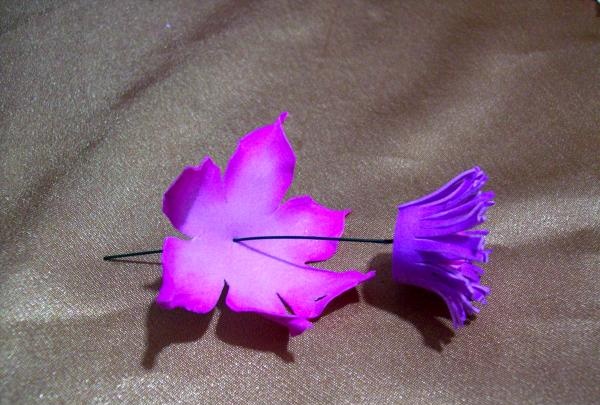
We glue it to the bottom of the stamens, simply lift it up along the wire.
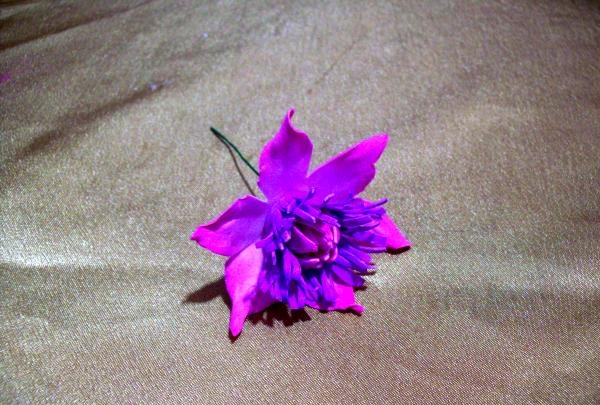
We attach the second petal of the anemone in the same way, but press it against the first one so that the petals are in a checkerboard pattern.
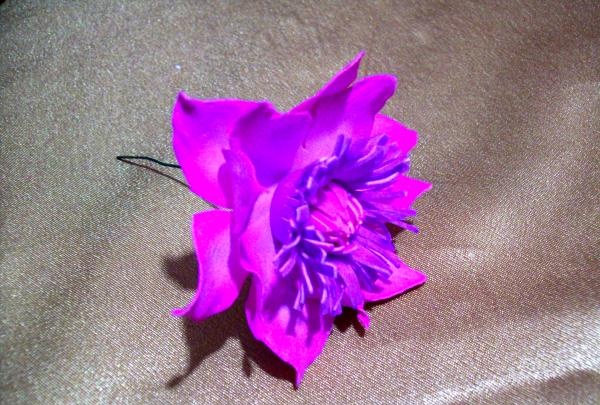
Now we turn the flower upside down with the wire, and put the green leaf on the flower, piercing it with wire, retreating 1 cm from the wide part of the leaf.
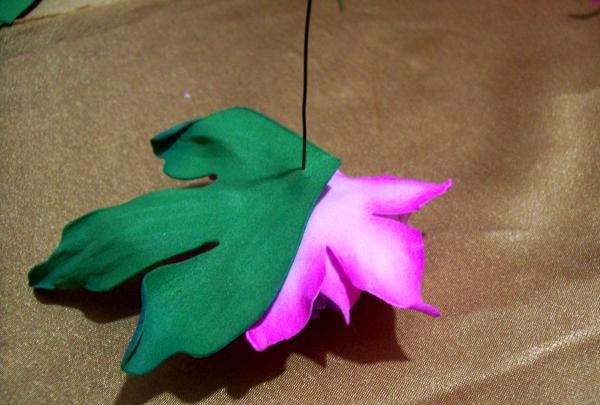
We also pierce and glue the second sheet, tilting them closer to one side.
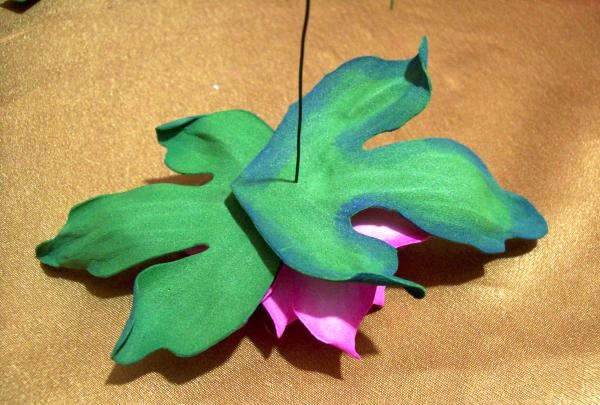
The flower is ready. There are two small details left. The first of them is decorating the second stamens with glitter glue for children's creativity.
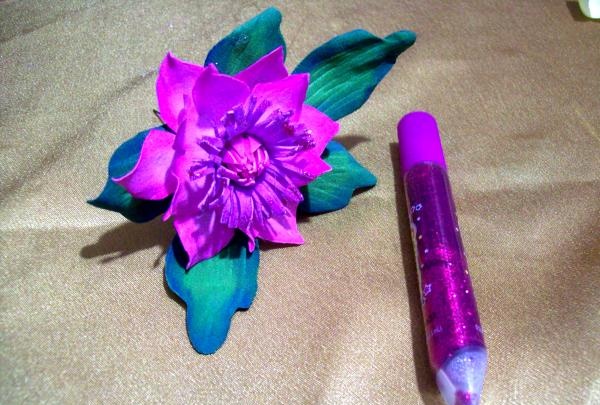
Now we take green corrugated paper.
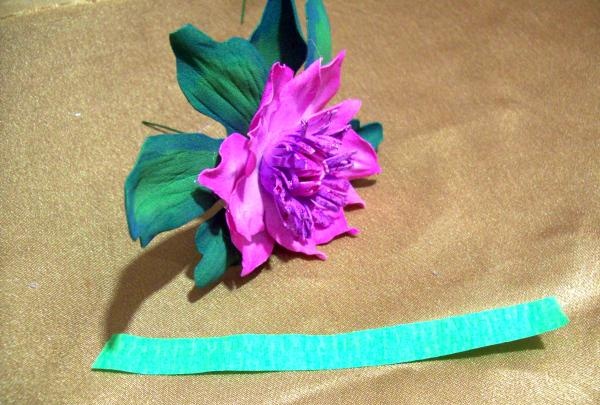
Using Moment glue we secure this tape along the entire wire.
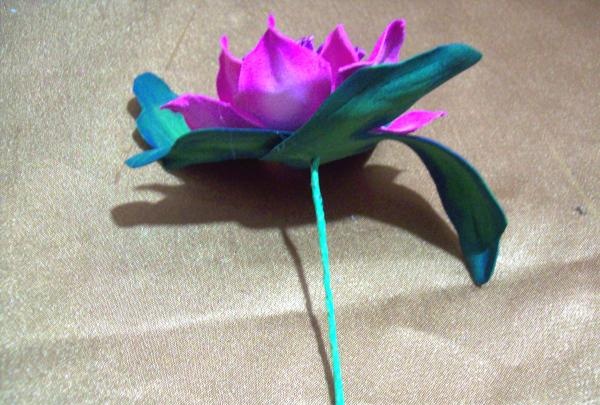
We begin assembling the hydrangea sprig. Let's take the stamens.
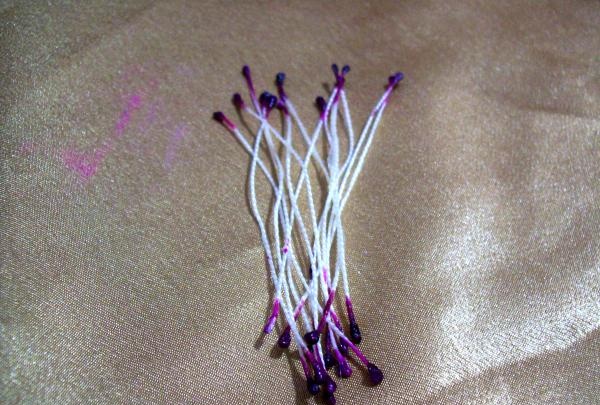
We cut them in half and secure them with a glue gun on the back side of the flower so that the stamen is in the middle of the workpiece, about 1 cm high. First, use a toothpick to make holes in all the small petals.
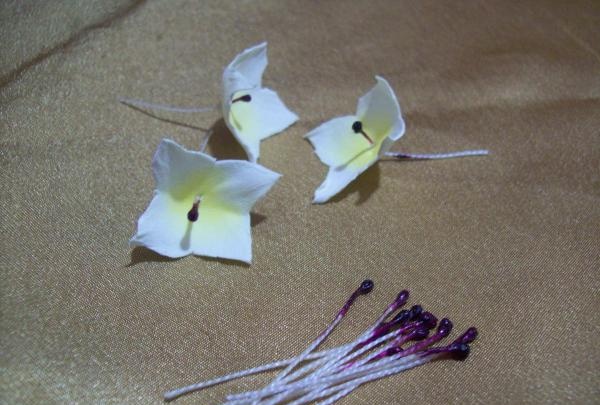
Glue the stamens to all the milky petals.
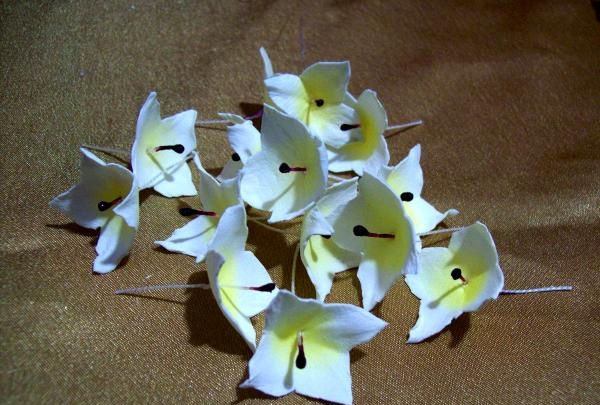
Now we again take 8 cm wire and a strip of corrugated paper. To the edge of the strip we attach the edge of the wire and two flowers by the edges of the stamens with “Moment” glue.
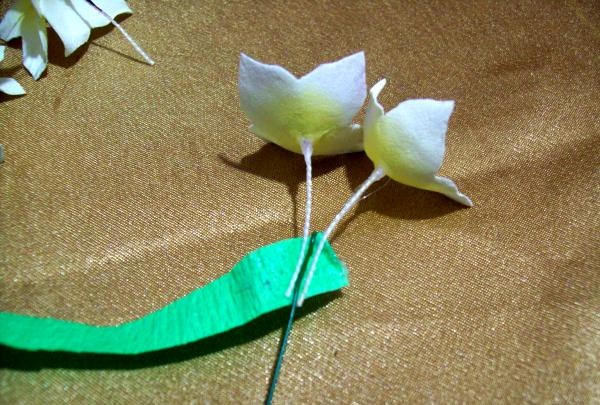
Having made two scrolls around the wire with tape, we secure a thin green sheet.
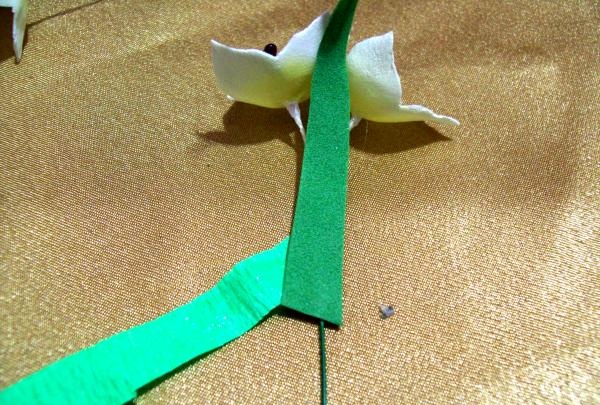
So we continue to alternate flowers and leaves, securing everything with corrugated paper.
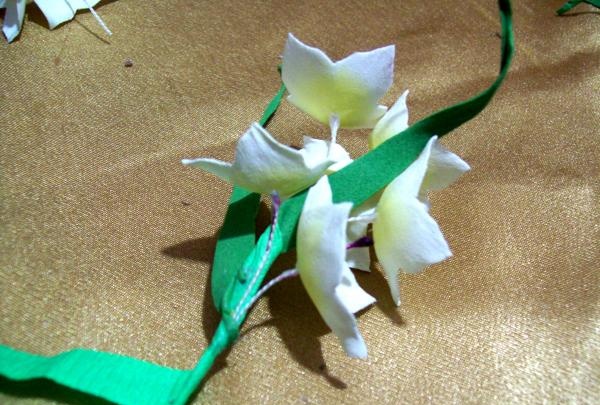
When there is 3 cm left to the edge of the wire, you need to attach an anemone flower to this place. But first, the wire on the flower needs to be bent. We retreat 1 cm from the leaves and tilt the wire down.
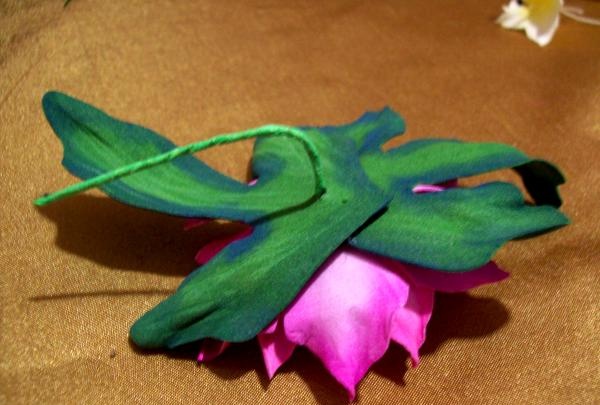
And we glue everything together with green tape. You can glue the remaining small petals. The branch is already ready.
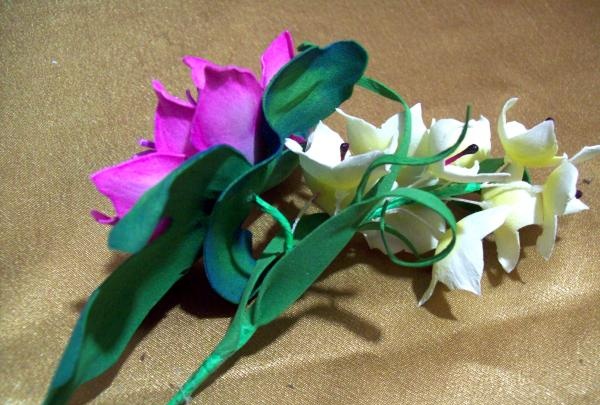
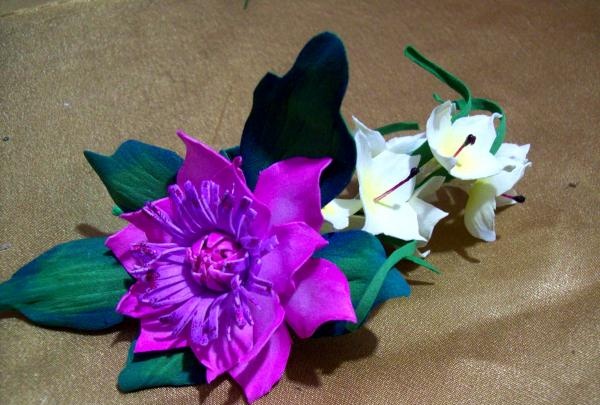
Now we take the finished twig, the 4 remaining milky flowers, a green ribbon 40 cm, 0.5 mm wide, and the glass itself.
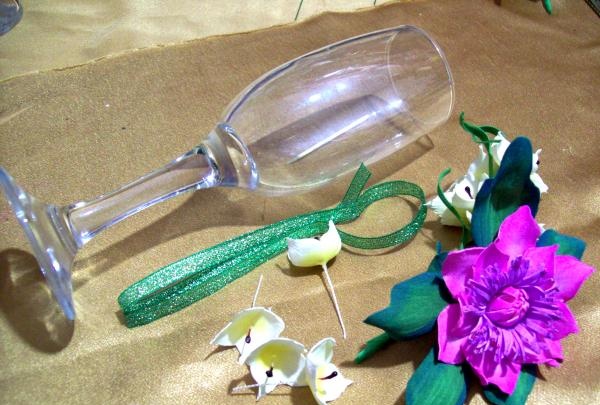
Take the Moment glue.We lubricate the stem of the glass with it, apply a twig, straightening the wire. And then we wrap it with a beautiful green ribbon, pressing it well to the glue. And all that remains is to secure two small flowers at the beginning and at the end of attaching the ribbon to the stem of the glass.
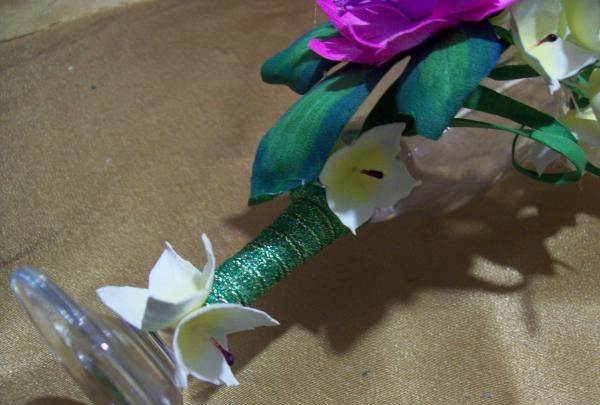
The glass is ready, it just needs time to dry. But we have a couple of glasses, so we decorate the second glass in the same way, only taking into account the tilt of the branch. On one glass in one direction, and on the other in the other direction from the anemone.
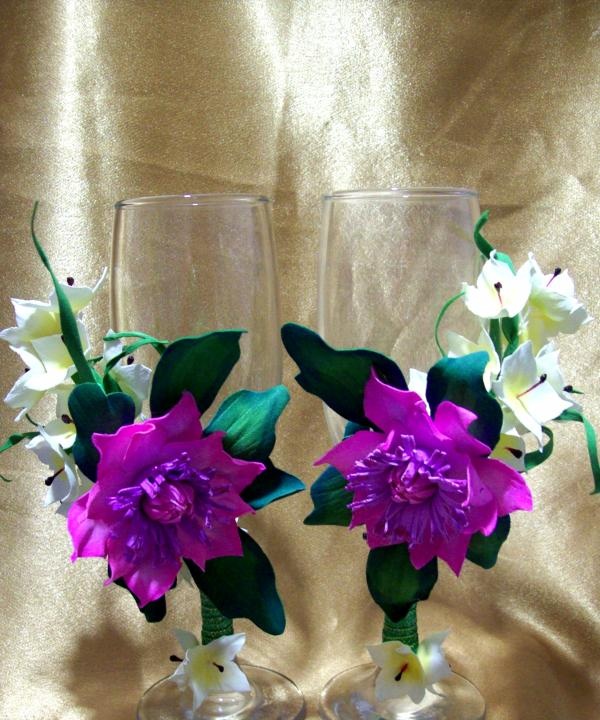
Good luck to all.

For work we will need the following materials:
- two tall glasses.
- plastic suede in pink, milky and green colors.
- 80 cm of green tape 0.5 cm wide.
- glue gun.
- floral wire.
- iron.
- scissors.
- “Moment” glue.
- wet wipes.
- toothpicks.
- tweezers.
- glue with glitter for children's creativity.
- the bed is dry, crimson, yellow and purple.
- ready-made stamens for flowers or homemade ones.
- corrugated paper.
First, let's draw templates for future colors. For one glass, the branch will consist of 1 anemone and two large leaves, you also need 10 hydrangea flowers with a diameter of 4 cm and 8 thin leaves. And the anemone consists of 2 six-leaf leaves, one with a diameter of 6.5x6.5 cm, the second 7x7 cm. The leaves for the anemone are 8x7 cm in size, and for the hydrangea we take a rectangle 5x8 cm. Then you need 2 strips measuring 1x16 cm and the second 10x2 cm.

We take pink foamiran and cut out two six-ladders and two stripes. From milky plastic suede we cut out 10-12 quatrefoils, and from green suede we cut out a triangle and two leaves.

We cut everything with one glass in mind. Now let's start coloring the petals. We take a dry bed of raspberry color and with a finger on which we placed a wet napkin, pick up a little paint and tint along the edges of the leaves on both sides. Considering that the paint will come off a little during further processing of the workpiece.

We will tint the thin strip with crimson, and the wide strip will be tinted with purple. On green leaves, we also pass along the edge with a damp cloth with a crimson bed. But on small flowers made from milk foam, we tint only the centers with yellow on both sides.

Now you need to cut the green rectangle into 8 parts, similar to a tall triangle. On the pink strip we make teeth like a saw. But the purple blank should have a fringe. You need to cut thin strips, but without cutting to the edge.

Turn on the iron to the second position or wool. We apply a strip with teeth to the heated surface; from the heat they will take a slightly different shape.

We process the purple fringe in the same way.

But after ironing, it is advisable to tighten the edges of the fringe with your fingers and they will become thinner and shaggier.

It's time to give the anemone petals a new shape. You also need to apply it to the iron a little and quickly fold it, in three steps, so that all the petals are on top of each other.

Now carefully roll all the edges of the petals together with your fingers, thinning them, then straighten them a little.

We continue to work on the petal.You need to carefully stretch and straighten each leaf of the petal in the middle with your fingers.

And twist the ends of this workpiece a little more. We process both petals in this way.

We also give the large green leaves a new shape. We apply it to the iron for a few seconds, and then use the edge of the tweezers to draw stripes, pressing on the sheet. To make the stripes better, you need to place the sheet on a fabric folded several times.

And again, using our fingers, we complete the creation of a new shape, making indentations along the edges and in the middle.

Now the leaves are ready.

Let's start with the hydrangea petals. We lay one at a time, and if possible, then two at a time, between corrugated paper. We take the iron and heat it through this paper, just press it with the iron. Then, additionally, press with your fingers. The petals have interesting stripes.

After ironing, we also fold all the petals one on one.

Just like in the previous petals, we twist it, but not much in these flowers. And straighten it, making a depression in the middle of the workpiece.

We give a new shape to all these petals.

And we give the green thin leaves a little scroll from the thin edge. Simply putting everything together, turn it several times with your fingers.

Let's start assembling the anemone flower. We take a piece of floral wire with a diameter of 0.8 mm and a length of 8 cm. We make a small bend loop on one edge.

Turn on the glue gun and carefully fasten the strip with the teeth, gluing them by turning them upward. We fix the entire strip at the same level.

Now we take a purple fringe strip and glue it on top of the first strip, keeping the bottom even. These will be the stamens of the flower.


Using a wire with glued stamens, we pierce the middle of a small pink petal.

We glue it to the bottom of the stamens, simply lift it up along the wire.

We attach the second petal of the anemone in the same way, but press it against the first one so that the petals are in a checkerboard pattern.

Now we turn the flower upside down with the wire, and put the green leaf on the flower, piercing it with wire, retreating 1 cm from the wide part of the leaf.

We also pierce and glue the second sheet, tilting them closer to one side.

The flower is ready. There are two small details left. The first of them is decorating the second stamens with glitter glue for children's creativity.

Now we take green corrugated paper.

Using Moment glue we secure this tape along the entire wire.

We begin assembling the hydrangea sprig. Let's take the stamens.

We cut them in half and secure them with a glue gun on the back side of the flower so that the stamen is in the middle of the workpiece, about 1 cm high. First, use a toothpick to make holes in all the small petals.

Glue the stamens to all the milky petals.

Now we again take 8 cm wire and a strip of corrugated paper. To the edge of the strip we attach the edge of the wire and two flowers by the edges of the stamens with “Moment” glue.

Having made two scrolls around the wire with tape, we secure a thin green sheet.

So we continue to alternate flowers and leaves, securing everything with corrugated paper.

When there is 3 cm left to the edge of the wire, you need to attach an anemone flower to this place. But first, the wire on the flower needs to be bent. We retreat 1 cm from the leaves and tilt the wire down.

And we glue everything together with green tape. You can glue the remaining small petals. The branch is already ready.


Now we take the finished twig, the 4 remaining milky flowers, a green ribbon 40 cm, 0.5 mm wide, and the glass itself.

Take the Moment glue.We lubricate the stem of the glass with it, apply a twig, straightening the wire. And then we wrap it with a beautiful green ribbon, pressing it well to the glue. And all that remains is to secure two small flowers at the beginning and at the end of attaching the ribbon to the stem of the glass.

The glass is ready, it just needs time to dry. But we have a couple of glasses, so we decorate the second glass in the same way, only taking into account the tilt of the branch. On one glass in one direction, and on the other in the other direction from the anemone.

Good luck to all.
Similar master classes
Particularly interesting
Comments (0)






